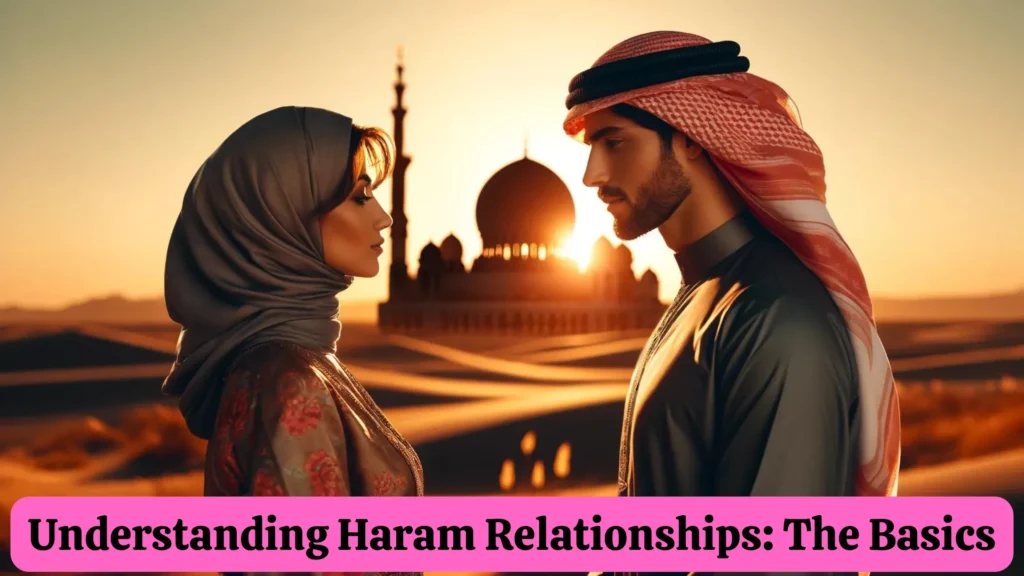
Have you ever questioned the meaning of love and relationships in your life? Have you found navigating the complexities of dating and romance challenging while staying true to your faith?
If so, you are not alone. Many Muslims, grapple with understanding what constitutes a haram relationship and how to ensure our relationships align with Islamic principles.
In Islamic terminology, a “haram” relationship refers to any relationship that is forbidden by Islamic law. This typically includes relationships that are outside of marital or family bonds that involve physical intimacy or emotional closeness that could lead to such intimacy. Haram relationships contradict the Islamic principles of modesty, fidelity, and lawful marital relations.
Join me as we explore the meaning of haram relationships in Islam and discover the wisdom behind avoiding them. Let’s delve into the guidance provided by the Quran and the Hadith to make sense of the principles and rules that govern halal relationships.
Key Takeaways:
- Understanding the meaning and implications of haram relationships is essential for Muslims who strive to lead a life in accordance with Islamic principles.
- Islam places a strong emphasis on modesty, chastity, and adhering to divine laws when it comes to matters of love and relationships.
- By avoiding haram relationships, we can create a foundation for relationships based on love, respect, and adherence to Islamic beliefs.
- The Quran and the Hadith provide invaluable guidance on setting boundaries, respecting others, and avoiding situations that may lead to haram relationships.
- Seeking guidance from scholars and adopting practices that strengthen our connection with Allah can help us navigate the complexities of relationships and pursue halal relationships.
The Hadith on Haram Relationships
The Hadith, the sayings and actions of Prophet Muhammad (peace be upon him), emphasize the importance of guarding our chastity and avoiding haram relationships.
In one such Hadith, the Prophet (peace be upon him) said, “When two people are (illegally) together alone then the third is Shaytan.”
This Hadith serves as a powerful reminder of the significance of staying away from situations that can lead us astray and towards sin.
It highlights the need to exercise caution and self-control in our interactions with the opposite gender.
By adhering to this guidance, we can protect ourselves from engaging in haram relationships and instead strive towards righteousness.
Guarding our chastity is a fundamental aspect of maintaining purity and upholding the values of Islam.
It is not only a religious obligation but also a means of preserving our emotional well-being and spiritual connection with Allah.
Why Haram Relationships are Forbidden in Islam
Haram relationships are forbidden in Islam for several reasons. First and foremost, Islam emphasizes the need for modesty and chastity.
Engaging in premarital relationships goes against these teachings, as Islam encourages individuals to refrain from engaging in any form of intimate relationship before marriage.
By avoiding haram relationships, we can uphold the values and principles of Islam and maintain the purity of our souls and communities.
Engaging in haram relationships can also lead to physical and emotional harm. From a physical perspective, premarital relationships can result in unwanted pregnancies and sexually transmitted infections.
Emotionally, these relationships can lead to heartbreak and the erosion of trust and emotional well-being.
Islam encourages us to protect ourselves and our partners from these potential harms.
As Muslims, it is our duty to adhere to the teachings of Islam and avoid relationships outside of marriage.
By doing so, we protect our spiritual well-being and ensure that our relationships are built on a strong foundation of love, respect, and commitment.
Respecting the boundaries set by Islam helps us maintain our moral compass and live in accordance with divine laws.

Rules and Principles in Islamic Relationships
Islam provides guidance on every aspect of life, including relationships.
When it comes to matters of the heart, Shariah rules and principles serve as a compass to help Muslims navigate the complexities of love, courtship, and relationships in a halal (lawful) way.
By following these principles, we can establish boundaries, maintain respect, and foster clear communication in our relationships.
The Quran and Hadith provide clear distinctions between what is halal (permissible) and what is haram (forbidden) in relationships, ensuring that we build our relationships on a solid foundation aligned with Islamic teachings.
Building a successful relationship starts with a strong commitment to following these rules and principles.
It means treating our partners with kindness, compassion, and fairness. It means seeking consent and mutual agreement in all aspects of our relationships.
It means being trustworthy, loyal, and supportive to our loved ones.
One of the key principles in Islamic relationships is the concept of “mahr,” which refers to the dowry or marital gift given by the groom to the bride as a symbol of his commitment and financial responsibility towards her.
This concept emphasizes the importance of financial stability and mutual support in a marriage.
Another principle is the focus on modesty and respect for one another’s physical and emotional boundaries. This includes refraining from engaging in intimate activities outside the bounds of marriage and treating each other with dignity and honor.
The Prophet Muhammad (peace be upon him) emphasized the importance of kindness and love within marriages. He said, “The best of you is the one who is best to his family, and I am the best to my family.” This encourages us to prioritize the happiness, well-being, and emotional support of our spouses.

In conclusion, understanding and abiding by the Shariah rules and principles in relationships is essential for Muslims seeking to pursue relationships in a halal way.
By following these guidelines, we can maintain the sanctity of our relationships, nurture a healthy and loving connection with our partners, and ensure that our relationships are built upon the foundation of Islamic values and teachings.
Forbidden Forms of Intimacy in Islam
In Islam, we believe that certain forms of intimacy are considered haram, meaning forbidden, when they occur outside the boundaries of marital relationships.
As Muslims, it is important for us to understand these boundaries and adhere to them in order to maintain the sanctity of our faith and relationships.
Premarital Relationships
Premarital relationships, including any romantic or sexual relationship between unmarried individuals, are strictly prohibited in Islam.
Islam teaches us that intimacy is a sacred bond that should be experienced within the context of marriage.
By abstaining from premarital relationships, we can ensure that our relationships are built on a foundation of trust, commitment, and mutual respect.
Extramarital Affairs
Similarly, engaging in adultery or extramarital affairs is considered a grave sin in Islam. The consequences of such actions can have a detrimental impact on individuals, families, and communities.
Islam emphasizes the importance of faithfulness and loyalty within the confines of marriage, and straying from this commitment is seen as a betrayal of trust and a violation of the sanctity of marriage.
Homosexual Relationships in Islam
In Islam, same-sex relationships are considered immoral and against the teachings of our faith.
Islam promotes the idea that marriage is a sacred union between a man and a woman, and any sexual relationship outside of this framework is not permitted.
While Islam teaches us to treat all individuals with kindness and respect, it is important to understand the boundaries set forth in our religion regarding intimate relationships.
We believe in upholding the sanctity of marriage and avoiding any form of haram or prohibited intimacy.
By following the guidelines and principles set forth in Islam, we can build strong, healthy relationships within the boundaries prescribed by our faith.
Consequences of Haram Relationships
Being involved in a haram relationship can have severe consequences. Not only does it violate religious principles, but it can also have legal repercussions.
Emotionally, individuals involved in haram relationships often experience guilt, shame, and regret.
These negative emotions can have a profound impact not only on the individuals themselves but also on their families and close friends.
It is crucial to understand the consequences of haram relationships and strive to avoid them to prevent such devastating outcomes.
Being engaged in a haram relationship carries implications beyond religious boundaries.
It also involves legal implications; hence individuals risk facing legal consequences for their actions.
Emotionally, people involved in haram relationships commonly grapple with negative emotions such as guilt, shame, and regret.
These emotions not only affect them personally but also have a ripple effect on their loved ones and close friends.
Understanding the consequences of haram relationships should serve as a deterrent, motivating us to avoid such relationships at all costs.
By prioritizing and upholding our religious values, we not only safeguard our own emotional well-being but also maintain strong connections with our loved ones.
Advice on Avoiding Haram Relationships from Scholarly Sources
When it comes to avoiding haram relationships and seeking a halal path, scholars provide valuable guidance.
They offer advice and support on how to navigate the complexities of relationships while upholding Islamic principles. Here are some tips that can help:
- Join a spiritual mentor: Seek guidance from a knowledgeable mentor who can provide direction on how to transition from haram relationships to halal ones. Their wisdom and experience can be invaluable in making the right choices.
. - Surround yourself with positive influences: Building a strong support network of like-minded individuals who share the same values and beliefs can help in resisting temptation and staying on the right path.
. - Cultivate self-discipline: Maintain self-control and discipline by avoiding tempting situations that may lead to haram relationships. By exercising restraint, we can protect ourselves from crossing boundaries.
. - Strengthen your connection with Allah: Deepen your relationship with Allah through regular prayer, studying the Quran, and engaging in acts of charity. Strengthening your spirituality and seeking guidance through devotion can guide you toward halal relationships.
. - Consider marriage: Marriage is a blessed and halal way to pursue relationships. As Prophet Muhammad (peace be upon him) encouraged young men to get married, it is seen as a means of safeguarding oneself from haram relationships if one is financially able.
Understanding Haram Dating
Haram dating refers to any dating or romantic relationship that is entered into solely for pleasure without a commitment to marriage. In Islamic culture, dating is permitted as long as the end goal is marriage.
Unlike haram dating, halal dating focuses on finding the right match and building a lasting relationship based on compatibility and a shared commitment to Islamic principles.
Halal dating prioritizes getting to know a potential spouse with the intention of establishing a lifelong partnership.
It involves respectful interaction, open communication, and the involvement of families in the process.
This approach promotes the development of a strong foundation and a deep understanding of each other’s values, beliefs, and goals.
By differentiating between haram and halal dating, Muslims can make informed choices in their pursuit of relationships.
It’s important to consider love and companionship within the boundaries set by Islam, prioritizing commitment, mutual respect, and the establishment of a healthy and fulfilling marital relationship.

Understanding the difference between haram and halal dating is particularly important for Muslims seeking relationships in accordance with their faith.
By following the principles of halal dating, individuals can foster relationships that are based on mutual understanding, respect, and a shared commitment to Islamic values.
Signs of Haram Dating and Its Consequences
Haram dating occurs when there is no intention for marriage or a future together.
It is important to recognize the signs that dating has crossed the line into haram territory, as well as the consequences that can arise from engaging in haram dating.
Signs of Haram Dating
- Pursuing a relationship solely for fun or physical attraction
- Engaging in physical contact before marriage
When dating is driven by purely selfish motives or when physical intimacy is involved outside of a marital relationship, it is a clear sign that it has become haram.
Consequences of Haram Dating
Haram dating can have serious consequences, both spiritually and emotionally.
Engaging in haram dating can lead to a distorted understanding of love and relationships.
It can create unrealistic expectations and leave individuals with emotional scars and regrets.
From a spiritual perspective, haram dating goes against Islamic principles and can lead to distancing oneself from Allah and feeling disconnected from faith.
It can also lead to feelings of guilt, shame, and loss of self-respect.
Emotionally, individuals involved in haram relationships often experience pain, heartbreak, and difficulty in trusting others.
The lack of commitment and sincerity in haram dating can leave individuals feeling used, disposable, and unvalued.
Recognizing the signs of haram dating and understanding its consequences is essential for Muslims to avoid falling into such relationships.
By adhering to Islamic principles and seeking relationships based on love, respect, and commitment to marriage, individuals can build strong and healthy connections that are pleasing to Allah.
How to Avoid Haram Dating and Stay True to Halal Relationships
Avoiding haram dating and maintaining halal relationships require commitment and action.
Here are some tips to help you navigate the complexities of finding a partner while staying true to your Islamic values:
- Cut off all connections with haram relationships: Delete contact information and block social media profiles of individuals involved in haram relationships. This step is crucial in breaking free from the temptation and influence of haram dating.
. - Surround yourself with righteous friends: Seek the support and companionship of friends who share your values and beliefs. Their positive influence will help you stay on the right path and avoid situations that may lead to haram dating.
. - Be honest with yourself: Reflect on the reasons for engaging in haram dating in the past. Understanding your motivations will help you avoid making similar mistakes in the future and approach relationships with a clear conscience.
. - Develop positive coping skills: Find healthy ways to cope with loneliness and desires. Engage in activities that bring you joy, such as hobbies, exercise, or helping others. Redirecting your energy towards positive outlets will strengthen your commitment to halal relationships.
. - Fast: Fasting not only has physical benefits but also helps strengthen your self-discipline and control over your desires. Fasting can be a powerful tool in overcoming temptations and staying focused on maintaining halal relationships.
. - Make dua (supplication): Turn to Allah in prayer, seeking guidance, strength, and forgiveness. Keep a sincere and humble heart, asking for His help in navigating relationships in a way that aligns with Islamic teachings.
. - Remember the purest love: Remind yourself that the purest love is the love between Allah and His creation. Seeking His pleasure and following His guidance is the ultimate source of strength and guidance in maintaining halal relationships.
By following these tips, you can avoid haram dating and establish meaningful relationships that are grounded in love, respect, and adherence to Islamic principles.
The Role of Love in Islam

Love is not haram in Islam. It is a beautiful feeling and a blessing. Muslims are allowed to find someone attractive and get to know a potential spouse before marriage.
However, it is important to approach love within the boundaries set by Allah. Having pure intentions and keeping the end goal of marriage in mind ensures that love is celebrated in the Islamic faith.
Developing a deep love and connection with Allah and seeking His guidance and forgiveness is the foundation of true love in Islam.
It is through this connection that we can experience unconditional love, both towards Allah and towards our fellow human beings.
Love in Islam goes beyond physical and romantic relationships; it encompasses love for family, friends, and the community.
Unconditional love in Islam is a selfless love that seeks to benefit others without expecting anything in return.
It is a love that is built on compassion, mercy, and kindness. Muslims are encouraged to love and care for one another, to be supportive and understanding, and to always strive for the well-being and happiness of others.
In Islam, love is a force that brings people together, strengthens relationships, and fosters unity within the ummah.
It is through the practice of love and compassion that Muslims can contribute to creating a harmonious and loving society.
In conclusion, love in Islam is a beautiful and integral part of the faith. When approached with pure intentions and within the guidelines set by Allah, love can thrive and bring immense joy and fulfillment to our lives.
By cultivating a deep love and connection with Allah and embracing the principles of unconditional love, Muslims can navigate relationships and interactions with love and compassion, creating a world filled with love and harmony.
Conclusion
In conclusion, it is of utmost importance for Muslims to understand the significance of avoiding haram relationships and instead choosing halal relationships.
By adhering to the divine laws and seeking guidance from scholarly sources, we can navigate the complexities of relationships with wisdom and purpose.
Love in Islam is not condemned, but rather celebrated when approached within the boundaries set by Allah.
With commitment, honesty, and a reliance on Allah, we can build strong and fulfilling relationships that are rooted in Islamic principles.
By making the conscious decision to choose halal relationships over haram ones, we invite blessings into our lives and protect the sanctity of marriage.
By prioritizing halal relationships, we not only fulfill our spiritual obligations but also nurture our emotional well-being.
This commitment allows us to experience the true essence of love, as intended by Allah.
It is through these halal relationships that we can find companionship, support, and growth, ultimately leading to a sense of fulfillment and harmony in our lives.
Frequently Asked Questions
Q: What relationships are forbidden in Islam?
In Islam, relationships that are forbidden (haram) include those outside of marriage between a man and a woman. This encompasses premarital and extramarital relationships, relationships with close family members (incest), and homosexual relationships.
Q: Can a haram relationship turn halal?
Yes, a relationship considered haram can become halal if the couple marries according to Islamic laws and principles. Marriage legitimizes the relationship under Islamic law.
Q: What are haram relationships in the Quran?
The Quran specifically outlines relationships that are considered haram, including adultery, fornication, and relationships with close relatives defined under the prohibitions of incest. Surah An-Nisa provides detailed descriptions of prohibited relationships.
Q: What age can Muslims date?
Traditional Islamic law does not specify an age for dating, as dating in the Western sense is generally not permitted. Instead, when individuals reach puberty and are deemed capable of marriage, they can consider marriage proposals in a manner that adheres to Islamic teachings and involves families.
Q: Is dating without touching haram?
Any form of intimate relationship or dating between non-married individuals, even without physical contact, is generally considered haram in traditional Islamic teachings. The focus is on emotional and physical purity prior to marriage.
Q: What is the punishment for a haram relationship in Islam?
The punishment for engaging in a haram relationship can vary widely depending on the country, local laws, and the specific circumstances. Under Islamic Sharia law, serious offenses like adultery may lead to severe penalties including lashes or stoning, but these are subject to stringent evidentiary requirements.
Q: Does being in a haram relationship break your fast?
Being in a haram relationship itself does not break the physical fast during Ramadan, but it is considered sinful and can detract from the spiritual benefits of fasting. Muslims are encouraged to avoid all sinful behavior during fasting.
Q: Is it haram to love someone before marriage?
Loving someone in a platonic and respectful manner is not haram, but engaging in a romantic relationship outside of marriage is considered haram. Muslims are advised to seek marriage if they develop romantic feelings towards someone, to maintain the relationship within Islamic guidelines.


